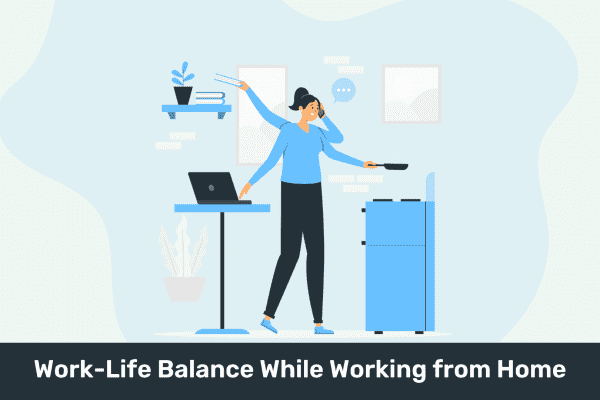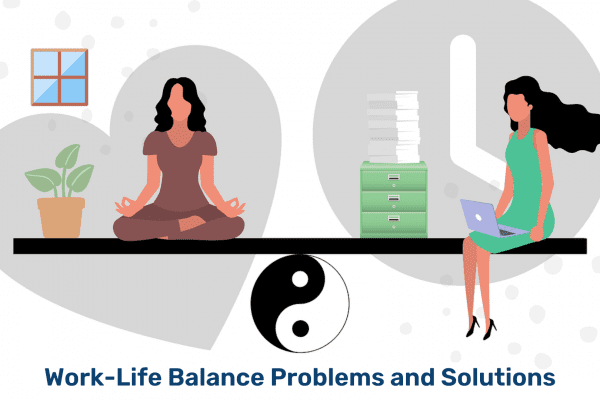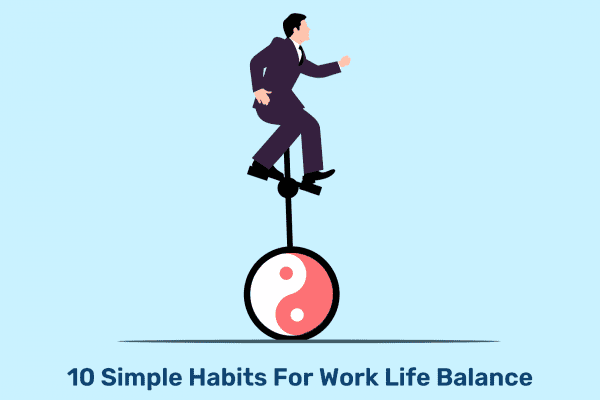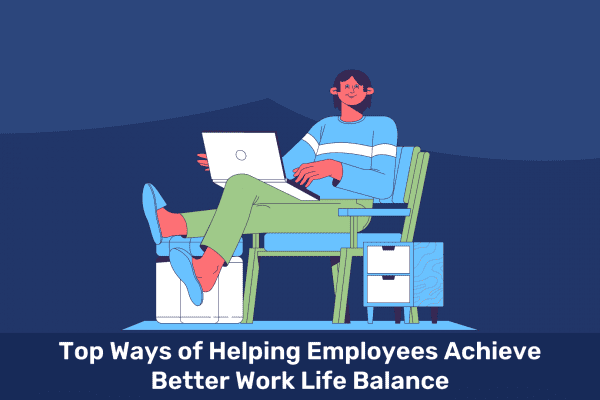More than 75% of employees in the U.S. say that stress levels from work affect their personal life. As workplace demands rise, more people are struggling due to a poor work-life balance. But how to keep improving work life balance?
This article is here to give you some tips on how to balance the scale when it comes to the workplace.
We cover setting different boundaries and mastering time management. We also look at how integrating breaks into your work life can make you more productive.
Then we will look at how to make the most of your downtime and how to manage your stress levels.
But first, let’s have a quick look at what a good work-life balance is and why it is so important.
What is the meaning of Work Life Balance?
A work-life balance can mean different things depending on who you are and how you work. In a nutshell, it is the balance between enjoying your personal life and time spent on work.
This balance can fluctuate over time depending on what is happening in your life and at work. This isn’t an issue as long as you are aware of it, and know how to reign it in if work is becoming too much.
Not being conscious of a lack of personal time can lead to high-stress levels. Over time this can manifest in serious mental and physical health problems.
If you don’t deal with a work-life imbalance then you can burn out. This has the potential to damage your self-esteem and career long term.
The following section will help you to manage this before you get close to that.
Maintaining Work Life Balance
Similar to maintaining a well-balanced diet for sustained health and vitality, individuals also require diversity in their activities and periods of rest to ensure optimal work-life balance. It’s a common misconception to believe that perpetual productivity is attainable, or that the amount of time spent working directly translates to the same amount of output. Yet, for many, achieving this is challenging, if not unfeasible.
Furthermore, excessively dedicating time to work carries detrimental outcomes for both workers and employers. Those inclined towards overworking, as well as those struggling with prioritizing self-care, face an elevated susceptibility to burnout, exhaustion, and health problems stemming from stress. Ineffectual work-life balance can also result in employees clocking in extra hours while experiencing a decrease in overall productivity.
Read More:
1. Why Is Work-Life Balance So Important?
2. Work Life Balance Problems and Solutions
Tips for Improving Work Life Balance
1. Have Clear Boundaries
In modern workplaces, many people work from home or have flexible hours. So it can be hard to know where work ends and personal life begins.
Also, we have constant access to technology that connects us to work. Social media, email, and phone calls can interrupt our personal lives. This blurring of the two worlds makes it hard to separate, leading to problems setting work aside.
The best way to combat this is to have clear boundaries with yourself and with others. Here are some pointers on different boundaries you can put in place.
Emotional Boundaries
In the workplace, create boundaries around how you want others to interact with you. It can be stressful when people don’t talk to you with respect or often talk about negative things.
These things can end up taking a lot of emotional headspace if they continue over a long period. Be proactive in creating an environment that you feel comfortable in. Avoid negative gossip and bad attitudes where possible.
Practical Boundaries
Sometimes it is good if you can put physical boundaries in place around your workplace. This could be something simple, like wearing headphones. This can signal to others that you are focusing and doing deep work.
But there are other complex social situations that could interfere with work-life balance. For example, there is often an office culture of going out with colleagues on a regular basis.
On the face of it, this might seem like a good thing, and it certainly can be. But often the expectation of going to all work social events can impact our own social lives.
You may sacrifice valuable family time to go to a networking event. Or you may not be able to finish a task as you have to go out for lunch with colleagues.
Make sure that you put your own needs first. Finish what you need to do before accepting any work-related invitations.
Speak with your manager about how the office can create a manageable social schedule. This way everyone can enjoy the events without compromising on productivity.
Mental Boundaries
Enforcing mental boundaries is very important for keeping a good work-life balance. This can be things such as sticking to your work hours and not going into overtime.
If you work with emails a lot, then try setting an out-of-office response at home time. This informs people that you will get back to them during your designated work hours and not before.
It is important that you let others know that this is a hard boundary for you so that they can respect your hours.
The Art of Saying No
All the above boundaries will likely mean that you will often have to say no to people. This can be difficult, as none of us want to feel like we aren’t pulling our weight.
But understand that you cannot be a productive member of the team if you get overwhelmed. Saying no to something that will put your work and life out of balance is nothing to feel guilty about.
If you have been clear with your various boundaries, then having to say no should happen less often. Remember that your health and well-being should always come before work.
2. Master Time Management
A good way to relieve pressure on yourself at work is to master time management. When we don’t work in an efficient way, it can create more work for us and things can take longer than expected.
Failing to complete things on time will eat into your free time, so it’s essential that you get a hang of it. So to help you, here are the best ways to improve your time management.
Set Clear Goals
Having clear, defined goals at work is the foundation of time management. Without them, you have no way to orient your work and you will end up wasting time on unnecessary tasks.
Whether you have your own workplace goals, or you have an assigned project, SMART goals are a great choice.
This system of setting goals can help you to work with more purpose and speed. This will free up more time to help you keep your work-life balance in check.
Prioritize Tasks
Once you have your goals set, then you can start prioritizing which tasks need to get done first. Try and organize them in order of importance and time sensitivity.
Don’t forget that you may be able to delegate or collaborate on some tasks. This can relieve some of the workload and free you up to focus on important tasks.
Planning and Scheduling
When you have your task list, planning creates a great structure to help you achieve them. It means you can be more productive with your time and you can see where you might need support.
It also means that you can plan in your personal time so that neither area of your life has to suffer.
Take a Break!
Taking some time away can be one of the best ways to reset and unwind from your work. Try and use your vacation days if possible, don’t save them up for a rainy day.
Sometimes it is not always possible to take a long break. So try and integrate ‘brain breaks’ into your work day to offer some relief.
You could also add pauses into your workflow using techniques such as Pomodoro. This can help to keep you on task without getting overwhelmed.
You could also take short walks around your office, or even better if you can go outside. Walking in nature can help you feel more clear-headed and alert.
3. Learning to Manage Stress
It may not always be possible to reduce your stress in the workplace directly. There may be a big project deadline or a colleague is off sick and those are things that you cannot avoid.
It is in these situations that learning to manage your stress will be vital. Even if you only have limited free time, there are some key factors that can help you to maximize your downtime.
Exercise
Maintain a regular exercise routine, as this is important for health and well-being. Even those with a busy schedule can find 30 minutes to an hour to fit in raising their heart rate!
Try to find classes that slot into your work hours, or integrate more walking into your commute. There are lots of options to be more active throughout the day, so get creative.
Activities You Love
Don’t compromise on doing the things that you enjoy. Having hobbies is a great way to lead a fun and balanced life.
They can give you a creative and social outlet, and a way to switch off from thinking about work. This will help you manage your stress levels and make you feel great!
Quality Time
One of the biggest problems of a poor work-life balance is that it sucks up time spent with loved ones. This can be a huge obstacle if you are trying to overcome stress from the workplace.
Our family and friends are key to providing emotional support during difficult periods. Find space in your week to spend time with loved ones to share quality time together.
Make sure you unplug during these times. That way you aren’t tempted to take calls or check emails.
4. Perfect vs Realistic
One way to combat a lack of work-life balance is to set realistic expectations. It’s easy to get caught up in what you think your day-to-day should look like.
The perfect work-life balance may be getting up, going to work, having a productive day, leaving on time, and spending the rest of the evening with your family.
However, that is not always realistic.
There may be days when you have to stay late at work or travel for your job. While there may be other days that you need to prioritize your family, your friends, or your mental health.
Having a realistic view of a work-life balance is going to be key to maintaining it. Every day may not be as balanced as you like. That’s okay, as balance is achieved over time, not on a daily basis.
It’s important that you regularly look at your goals and remain flexible. Your ideal work-life balance may change over time.
It’s also important not to compare yourself to other people. Your version of work-life balance may not be the same as your friend or coworkers.
5. Practice Self-Compassion
You should always give yourself grace. If you’re constantly focused on having the perfect work-life balance, you’re going to give yourself more stress.
Creating the right balance isn’t always easy, and you may not get it right every day or every week, or every month. If you allow yourself to make mistakes and continue to grow, you’ll be able to support a healthier lifestyle.
6. Start Small
When it comes to setting boundaries at work, it’s best to start small. Otherwise, you could overwhelm yourself and cause yourself more stress and even burnout.
If you try to make big changes all at once, there’s a higher risk of you failing. When you start small, you give yourself more time to establish healthy habits. You are able to stick to your goals because they are manageable.
When you’re trying to reduce the lack of work-life balance, consistency is key. If you start small, you’ll give yourself more time to build up and develop consistent routines that will allow you to be successful in creating a balanced lifestyle.
If you become overwhelmed when you’re setting your goals and trying to implement changes, you’re more likely to fail. It’ll be easier to fall back into old routines and unhealthy habits. Starting with a few realistic changes will allow you to build up confidence and motivation to continue making progress and changes.
7. Use Your PTO
Finding the best jobs for work-life balance isn’t always easy, but once you do, it’s imperative that you use your vacation days. Vacation days are part of your compensation.
In order to stay healthy, avoid burnout, and create a work-life balance, you must use your PTO.
You must take time off in order to recharge. You can’t do your best work if you’re constantly bogged down mentally and physically.
Unplugging from work can be really intimidating and scary for people. However, it’s necessary if you want to have a happy and healthy life.
A one or two-day staycation can be just what you need to reset and recharge. You may want to take two weeks off and visit Europe.
Either way, it’s crucial that you use the vacation days that you have. Don’t let them go to waste.
8. Talk to Management
If you’re feeling physically and emotionally exhausted from your job, talk to management. They are there to support you. If you’re uncomfortable talking to leadership, it may be time to find a new job or talk to your human resource representative.
Your superiors have no way of knowing how you’re feeling unless you communicate with them.
If you’re having trouble managing your workload or if you need time to reset, you can come up with a strategy or a plan with your boss and coworkers so that you can do your best work in the future.
9. Take Lunch
There are little actions you can take every day to help create work-life balance. One of those things is taking your lunch.
Oftentimes, employees will eat at their desks and continue to answer emails and take phone calls. However, it’s crucial for your mental health, that you get up and leave your desk during your lunch break.
Be mindful of what you’re doing with your time during your lunch.
You can take a walk, do some breathing exercises, or do a short meditation to help you become more present.
You shouldn’t have to work through your lunch break every day. It’s a bad habit that can contribute to burnout and extra stress.
10. Communication is Key
Communication is crucial when you’re creating a healthy lifestyle. You need to talk to your coworkers, your bosses, your family member, and friends. Having a support system can make work-life balance much easier.
You can also gain a lot of knowledge from others. You never know what advice or tools the people around you have to offer. They may be able to help you establish a healthy routine.
Final Thoughts
Having a poor work-life balance can be a huge detriment to our mental wellness and personal lives. Luckily, there are lots of tips for improving work life balance. Boundaries, managing stress, and communication are great ways to fix an imbalance.
Employers that care about employee well-being will want to improve their work-life balance. That is where Woliba comes in!
Woliba is an intuitive platform focused on employee engagement, recognition, and wellness. If you’re looking to create a productive and happy environment, then schedule a demo today!





